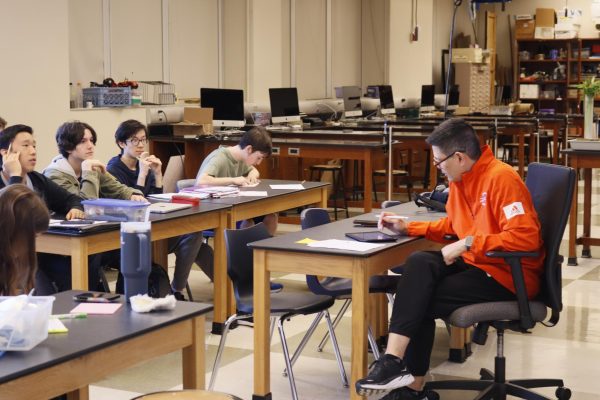Customer mask-wearing during a pandemic
Some restaurants and businesses have implemented new rules and mandates for customers to ensure safety in the community.
Wonton King’s empty dining room amidst COVID-19.
You walk into your local grocery store and notice a sign that informs customers they must wear a mask inside, you put your mask on and push through the door. You hear someone yelling a few aisles down and soon find that a customer is refusing to wear a mask. One of the store’s employees kindly asks if they would put one on, or if they need to borrow one from the store. The customer continues to argue with the employee about their rights as a citizen to control their body and the lack of necessity masks have. Then, the employee has to kick the customer out of the store for threatening your safety, and those around you. This is the reality many stores nationwide have had to face since re-opening during COVID-19. Specifically in the Clayton area, almost every grocery store, boutique, and restaurant have a mandatory mask rule for customers and employees.
In early July, Missouri’s governor Mike Parson stated he was not going to issue a statewide mask mandate, instead, he made it a local decision for Missouri cities and counties. According to the Missouri Times, Parson said, “Again, for people that live in those places that want to live under those guidelines, that’s their elected leaders’ decisions.” By not issuing a statewide mask mandate, masks can feel optional in public places for some individuals, leading to protest in stores and workplaces. In Clayton, a mask mandate was issued in July. It states that face coverings should be worn in all indoor spaces and outdoor spaces where you cannot maintain a six-foot distance from others if you are over the age of five.
Due to the mandate, virtually every store and restaurant in the Clayton area requires its customers to wear a mask at all possible times. Restaurants usually require masks upon entry, before being seated at a table, to protect people that may be waiting and the employees. Sophie Matiszik, a Junior at CHS, works at the Vitality Bowls in Richmond Heights. She said, “There is a mask mandate at my work, both employees and customers must properly wear masks when inside the restaurant, unless eating in the dining area.” By properly wearing a mask (over the nose and mouth) customers and employees decrease their risk of getting the virus by 65%.
A survey in late July given by the newsletter, Restaurant Dive, said 96% of the restaurants surveyed required their employees to wear masks while working. Although wearing a mask in a store or restaurant during a global pandemic seems like common sense, masks have become a political issue driven by emotions and opinions. On social media, there are many videos showing shoppers at grocery stores throwing a tantrum when asked to wear a mask, some even become violent and start assaulting the employee or throwing the stores products onto the ground. But, most Americans feel that a mask mandate in public storefronts is necessary. Another survey conducted in July, a Harris Poll, showed that 76% of citizens believed that retail businesses should institute a mask policy for all customers.
While a lot of storefronts have not experienced violence due to their mask mandates, employees still have to remind customers to wear a mask, or to wear one properly. “Sometimes it takes me a couple tries to tell customers to wear a mask properly over their nose and mouth,” Matiszik said. Customers may be ignorant to the true risk of COVID-19, or choose to leave their nose outside of their mask, claiming that they “can’t breathe”, nevertheless, employees at different businesses are responsible for enforcing their mask policy onto the customers.
While many Americans have become accustomed to new rules regarding the virus, including mask mandates and social distancing guidelines, some businesses still face opinionated customers who refuse to respect these rules. By instituting a mask policy, stores reduce the risk of infection in their employees and customers as well as follow the guidelines put in place by the CDC for the virus.
A $50 or more donation includes a subscription to the Clayton High School Globe 2024-2025 print news magazine.
We will mail a copy of our issues to the recipients of your choice.
Your donation helps preserve the tangible experience of print journalism, ensuring that student voices reach our community and that student democracy thrives.
Sasha is a senior at CHS and is on her fourth year with Globe. This year, she is the Pro/Con Section Editor.

Lily Kleinhenz is a Senior at Clayton High School Missouri. She is a Chief Digital Editor and a part of Photo Journalism. Lily loves writing and reading, taking photos, shopping,...











